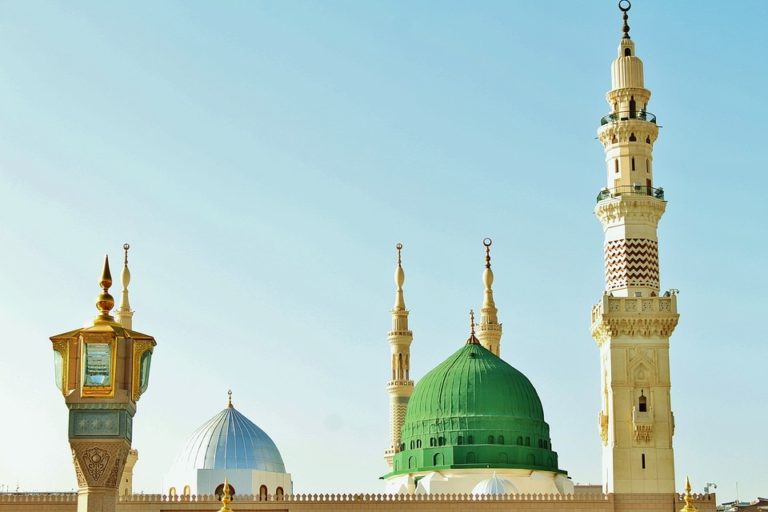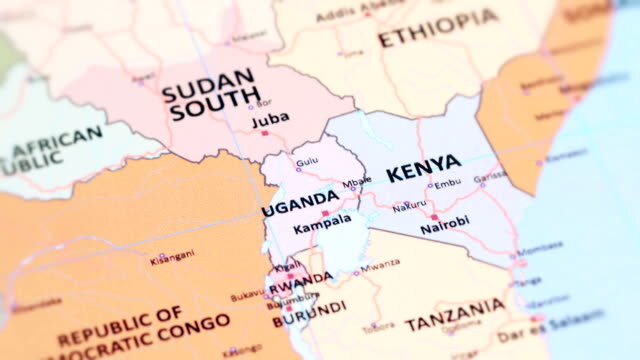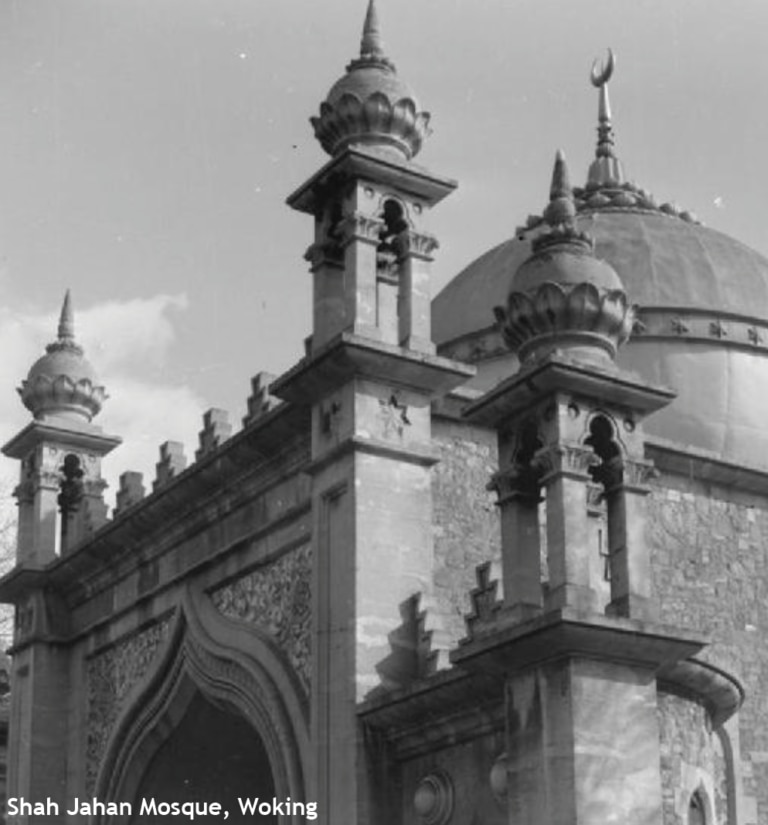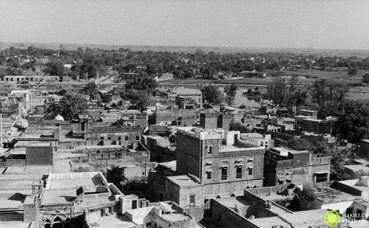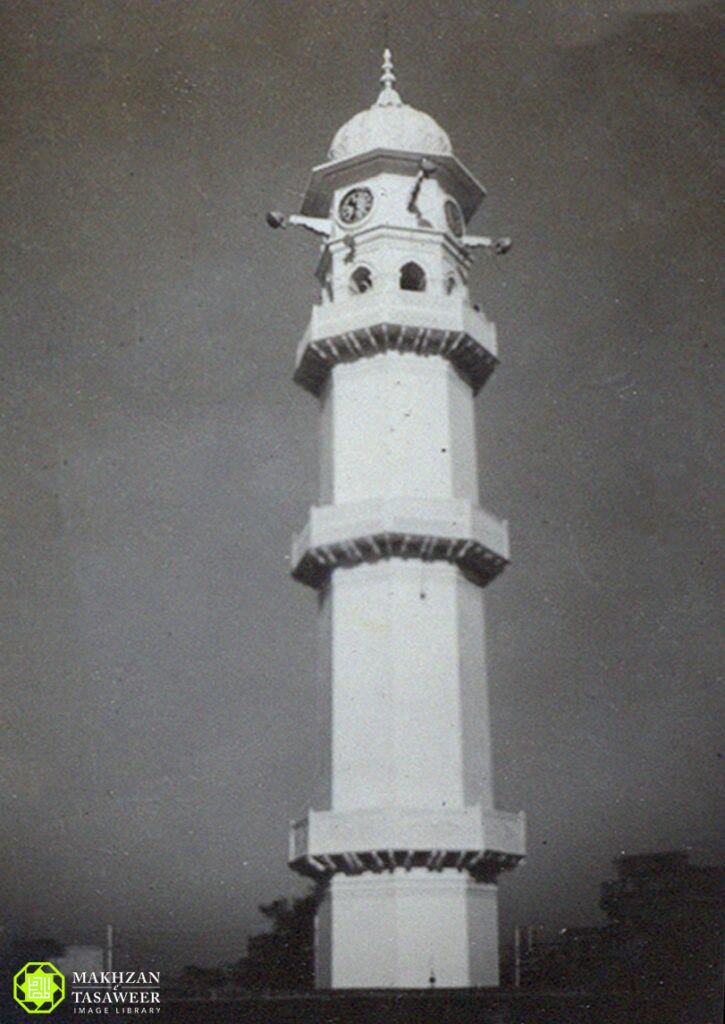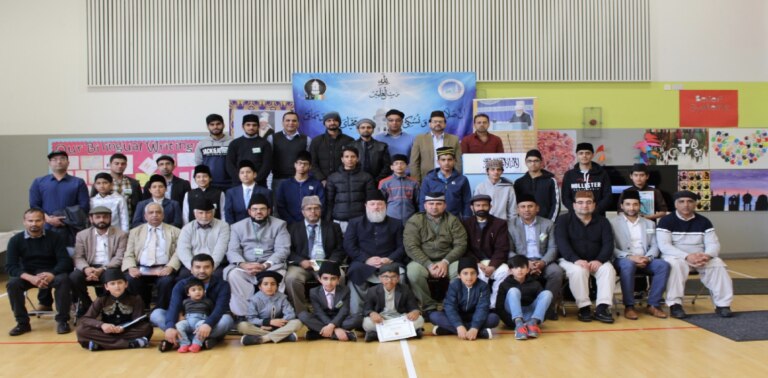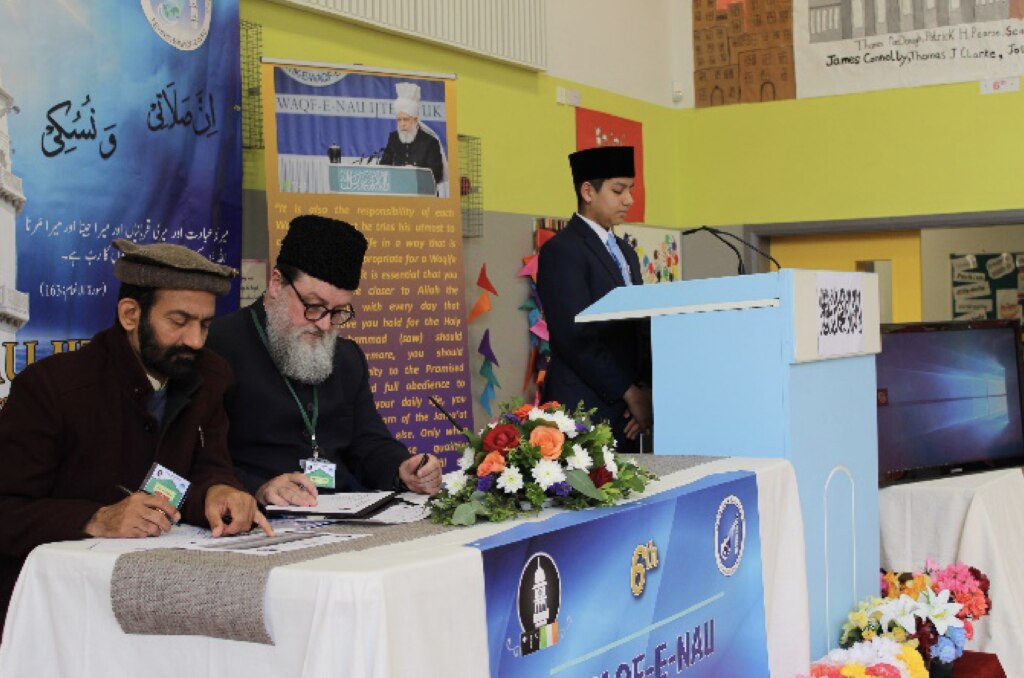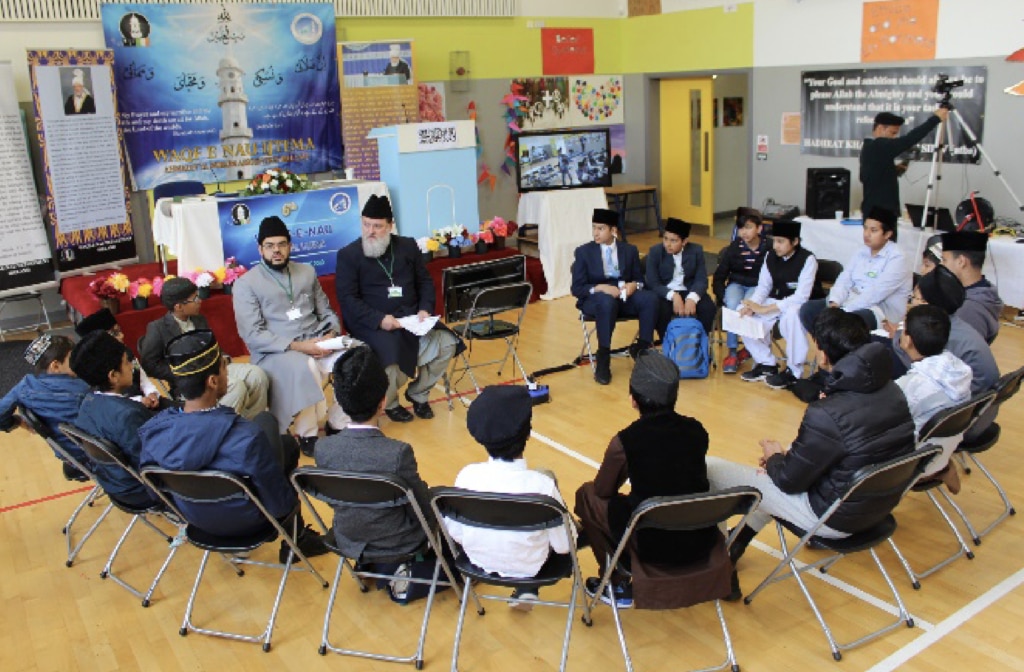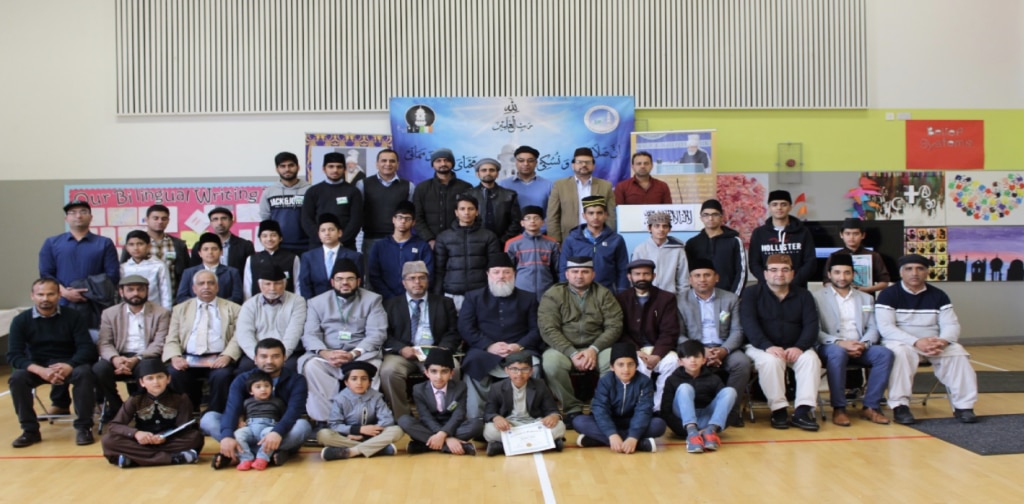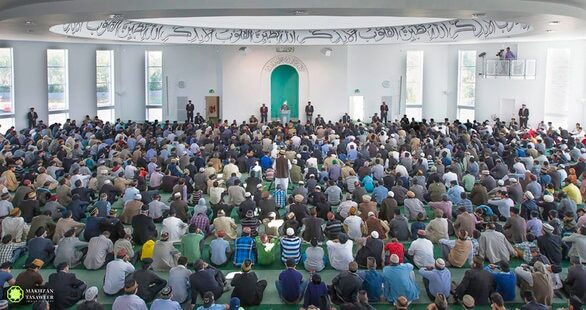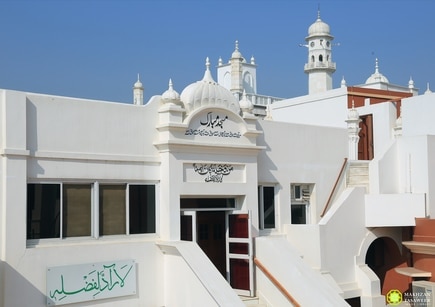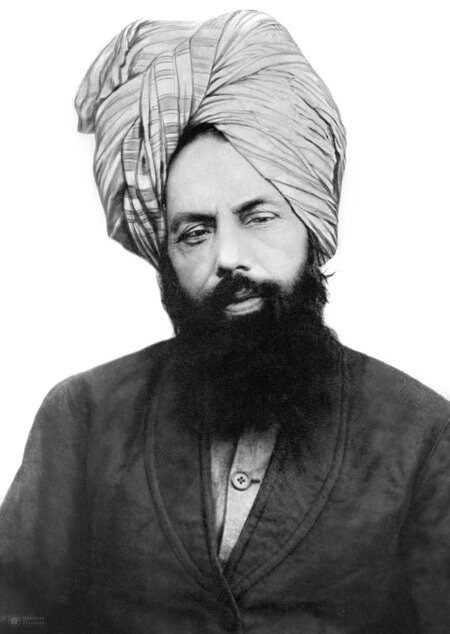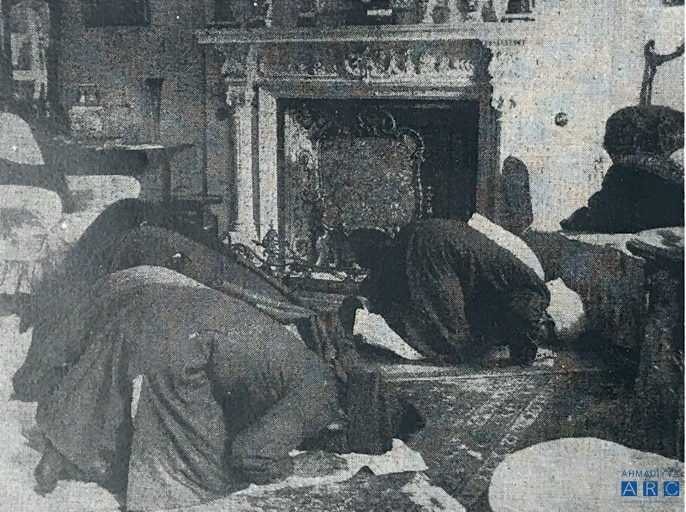Friday Sermon
31 May 2019
The Significance of Jumuah Prayers
After reciting the Tashahud, Ta‘awuz, and Surah al-Fatihah, Hazrat Khalifatul Masih Vaa recited verses 10-12 of Surah al-Jumuah, after which he commenced with the Sermon:
یٰۤاَیُّہَا الَّذِیۡنَ
اٰمَنُوۡۤا اِذَا نُوۡدِیَ لِلصَّلٰوۃِ مِنۡ یَّوۡمِ الۡجُمُعَۃِ فَاسۡعَوۡا اِلٰی
ذِکۡرِ اللّٰہِ وَ ذَرُوا الۡبَیۡعَ ؕ ذٰلِکُمۡ خَیۡرٌ لَّکُمۡ اِنۡ کُنۡتُمۡ
تَعۡلَمُوۡنَ۔ فَاِذَا قُضِیَتِ الصَّلٰوۃُ فَانۡتَشِرُوۡا فِی الۡاَرۡضِ وَ ابۡتَغُوۡا
مِنۡ فَضۡلِ اللّٰہِ وَ اذۡکُرُوا اللّٰہَ کَثِیۡرًا لَّعَلَّکُمۡ تُفۡلِحُوۡنَ۔
وَ اِذَا رَاَوۡا تِجَارَۃً اَوۡ لَہۡوَاۨ انۡفَضُّوۡۤا اِلَیۡہَا وَ تَرَکُوۡکَ
قَآئِمًا ؕ قُلۡ مَا عِنۡدَ اللّٰہِ خَیۡرٌ مِّنَ اللَّہۡوِ وَ مِنَ التِّجَارَۃِ
ؕ وَ اللّٰہُ خَیۡرُ الرّٰزِقِیۡنَ۔
The
translation of these verses is as follows:
“O ye who believe! when the call is made
for Prayer on Friday, hasten to the remembrance of Allah, and leave off all
business. That is better for you, if you only knew. And when the Prayer is
finished, then disperse in the land and seek of Allah’s grace, and remember
Allah much, that you may prosper. But when they see some merchandise or some
amusement, they break up for it, and leave thee standing. Say, ‘That which is
with Allah is better than amusement and merchandise, and Allah is the Best
Provider.’” (Surah al-Jumuah, Ch.62: V.10-12)
Today is the last Friday of this Ramadan.
As it is usually the case, people are generally more inclined and pay special
attention towards attending this Friday Sermon. Coincidentally, the majority of
schools are on term break and hence, we can see an increased attendance as is
generally the case.
The verses that I have recited are from
the last ruku‘ of Surah al-Jumuah. In these verses, God Almighty has
clearly explained the significance of the Friday prayers. Thus, in the sight of
God Almighty, attending the Friday prayers is of vital importance.
God Almighty has clearly stated that when
one is called for the Friday prayer, then one should not show any sort of
listlessness. Rather, one ought to pay heed immediately and attend the Friday
prayer, regardless of how busy one may be. Even if it is the peak business
hour, whereby neglecting the business affairs and trade can result in a loss of
millions for a businessman, one should not care about it and should attend the
Friday prayers. This is because going to the central mosque to attend the
Friday prayers and listening to the Friday sermon of the imam is hundreds of
thousands of times better than one’s trade, businesses and other worldly
affairs. However, only such an individual can realise this, who truly
understands its importance.
God Almighty states that one who truly
understands its true significance would certainly consider these trades and
businesses of secondary importance. At the same time, God Almighty also states
that one is free to go about their affairs after the Friday prayers. He states
that by all means, one can go and see to their worldly affairs and businesses
and that He will grant them His blessings.
However, He also makes clear that one should not restrict their worship
merely to the Friday prayers, rather one should remember God Almighty at all
times.
One should remain focused on the
remembrance of God Almighty, as a result of which one will be granted with
greater success than before – religiously, spiritually as well as worldly.
Those who remember God Almighty, they are also mindful of the fact that
following the Friday prayer, they have to offer the Asr prayer as well, as this
is also among their obligations. Similarly, they are mindful of the fact that
they have to offer Maghrib and Isha prayers as these are also among their
obligations. Both worldly affairs and other blessings are acquired through the
grace of God Almighty alone. Thus, prosperity is interlinked with the
remembrance and worship of God Almighty. Trying to offer the Friday prayer with
regularity, remembering God Almighty and fulfilling the due rights of His
worship should not be limited to the month of Ramadan alone, rather, as it is
evident from these verses, this is a general command relating to every Friday
prayer. The verse contains a general instruction as well as a specific
instruction.
While mentioning the importance of the
Friday prayer, on one occasion the Promised Messiahas states that
Friday is a day of Eid, and this Eid is far greater than the other Eid
celebrations. With regard to how it is superior, the Promised Messiahas
states that Surah al-Jumuah has been revealed for this Eid. That is, particular
attention has been drawn towards offering Friday prayers in Surah al-Jumuah.
Furthermore, whilst stating the importance of Friday prayers, the Promised
Messiahas has also mentioned a conversation between Hazrat Umarra
and a Jewish man. The incident is as follows that when the verse:
اَلۡیَوۡمَ اَکۡمَلۡتُ لَکُمۡ دِیۡنَکُمۡ
“This day have I perfected for you your
religion”, was revealed, a Jew said that the Muslims ought to celebrate Eid on
the day this verse was revealed; or he said that if this verse was revealed to
us, we would have celebrated Eid. Hazrat Umarra replied that Friday
is a day of Eid as this verse was revealed on a Friday.
The Promised Messiahas states
that many people are unaware of the true essence of this Eid. (Malfuzat,
Vol. 8, p. 399)
God Almighty has enjoined to celebrate
this Eid every week. It contains within it glad tidings of faith having been
perfected and the completion of the favours of God Almighty. This day is not
given its due importance and people simply believe that by making particular
efforts to attend the last Friday prayer of Ramadan, they will attain the
reward of every Friday prayer. Hence, we must be very mindful of safeguarding
our Friday prayers. We must give the same importance to each and every Friday
prayer throughout the year as we give to the last Friday prayer of Ramadan.
God Almighty says that every true believer
should pay attention towards this. However, in reality many people do not pay
attention towards this and they waste their Friday prayers for the sake of
worldly affairs and materialistic pursuits. God Almighty has stated that one
should know that whatever is with God Almighty is far greater than these
material objects, wealth and one’s worldly pursuits. Furthermore, it is God
Almighty alone Who grants man provisions. Hence, this is a matter of great
importance and one that every believer should pay attention towards. We in
particular, who believe in the Imam of the age, must pay special attention
towards this.
Hazrat Khalifatul Masih Ira
would say that Ahmadis are in fact true believers, as Ahmadis have accepted the
Imam of the age. (Haqaiq-ul-Furqan, Vol. 4, pp. 122-123)
Hence, this belief places a responsibility
on us to align our actions in accordance with the teaching of God Almighty as
well as to try and obey His commands. Worldly desires should not be our
preferences, rather, the pleasure of God Almighty and acquiring His pleasure
should be our preference. However, there are many among us who tend to forget
the reason why they have accepted the Promised Messiahas.
The Promised Messiahas was sent
to strengthen our relationship with God Almighty. He appeared in order to make
us understand that one’s ultimate objective should be to attain the pleasure
and love of God Almighty. It should not be the case that one should only pray
to God Almighty, supplicate and prostrate before Him when one’s worldly desires
are not being fulfilled. Moreover, it should also not be the case that one is
unmindful of the importance of attaining the pleasure of God Almighty and only
gives preference to their desires and worldly needs.
At one place the Promised Messiahas
states:
“I say truly that the Friday prayer has
been established as a special occasion for the fortunate ones; blessed are
those who benefit from it. Those of you who have established a bond with me
should never become arrogant that you have accomplished what was required of
you. Indeed, it is true that you are closer to me than those who have rejected
me, i.e. those who have incurred God Almighty’s displeasure owing to their
vehement rejection and dishonour.”
The Promised Messiahas further
states:
“It is also true that you employed
positive reasoning with regard to me and protected yourself from the wrath of
God Almighty. However, the reality is that you are a step closer to that
fountain established by God in order to bestow everlasting life. Indeed the
only thing left is to drink from this fountain. Thus, implore God Almighty so
that He many grant you the ability to drink from this fountain. It is only through
His grace and mercy that one can drink from it and satiate their thirst;
without God, nothing is possible. I am certain that whoever drinks from this
fountain will not be destroyed because this water grants life and protects one
from destruction and the attacks of Satan. How can one fully replenish
themselves from this spring? It is by fulfilling the two rights God Almighty
has made incumbent upon you to your utmost ability; one of these is to fulfil
the rights due to God and the other is to fulfil the rights due to His
creation.” (Malfuzat, Vol. 3, pp. 184-185)
Thus, the Promised Messiahas
has explained that one’s actions should be in accordance with the teachings of
God Almighty and that after accepting the Promised Messiah, one should raise
the standard of their worship and also in serving humanity. If this is not
accomplished, then one cannot be counted amongst those who attain the favours
of God Almighty in a manner that one truly ought to. In order to drink water
from this fountain, one must revaluate their preferences and objectives.
Hazrat Khalifatul Masih Ira
once stated, “I am anxious to know if I am the one being addressed in the
statement of the Promised Messiahas where he stated that people have
yet to drink water from this fountain.” (Haqaiq-ul-Furqan, Vol. 4, p.
126)
We are all aware of the lofty status of
Hazrat Khalifatul Masih Ira since the Promised Messiahas
held him in high esteem. If he was anxious about this, then how concerned
should we be in relation to striving to drink from this fountain and to become
those who discharge the due rights of our pledge of allegiance? Hence, it is
vital to attain the pleasure of God Almighty in order to discharge His rights.
It is necessary to bear in mind whether we have fulfilled the due rights of His
worship because He has established worship as the sole purpose of our creation.
God Almighty states:
وَ مَا خَلَقۡتُ الۡجِنَّ وَ الۡاِنۡسَ اِلَّا لِیَعۡبُدُوۡنِ
“And I have not created the Jinn and the
men but that they may worship Me.”
God
Almighty has elaborated the purpose of our creation. God Almighty did not state
that since one obeys His commandment by offering the last Friday prayer of the
month of Ramadan that one has fulfilled the due right of His worship. In fact,
He stated that this is a practise that one must adopt from an early age right
until one’s last breath.
Hence, do not be under the impression that
offering one Friday prayer in the year is sufficient, rather every single
Friday prayer is important. Whilst drawing attention to observing the Friday
prayers, God Almighty has not stated that one should offer the prayers to
fulfil the rights owed to Him or offer the daily prayers as they benefit God
Almighty in any way, or that God Almighty is in need of our Friday prayers and
remembrance. Rather, God has stated that when a person goes for the Friday
prayers, offers the prayers, listens to the sermon and remembers God, there
comes an hour wherein God Almighty accepts whatever His servant asks of Him. In
other words, if God Almighty grants man such an hour, then apart from things
which are unlawful, whatever man requests is granted to him. (Sahih Muslim,
Kitab-ul-Jumuah, Hadith no. 852)
Bear in mind that this hour and this time
is not specific to any particular Friday, it is for each and every Friday
prayer.
Whilst stressing the importance of the
Friday prayers, on one occasion the Holy Prophetsa stated:
“Whoever believes in God and the
Hereafter, it has been made incumbent upon them to offer the Jumuah prayer on
Friday, except for the sick, the wayfarer, women, children and the bondsman, as
they are all compelled by certain limitations.”
The Holy Prophetsa then stated,
“He who is neglectful of the Friday prayers owing to their frivolous pursuits
or trade, God Almighty shall also pay no regard – surely Allah is
Self-Sufficient, Praiseworthy.” (Kanzul Ummal, Vol. 7, p. 726,
Kitab-ul-Salat, Hadith no. 21120)
God Almighty is not in need of anything
from us. In fact, He is the One Who bestows everything, and owing to this, He
requires that a believer ought to praise Him. The Holy Prophetsa
also stated that the reward for good deeds on Friday increases manifold. (Kanzul
Ummal, Vol. 7, p. 712, Kitab-ul-Salat, Hadith no. 21057)
What further good deeds are there outside
the sphere of the commandments of God Almighty and acting upon them? Therefore,
when a believer acts upon the commandments of God Almighty, for the sake of
attaining His pleasure, among which is the command to attend the Friday prayers
and to pay attention towards prayer and worship, then this is indeed a great
virtue.
Furthermore, how great a reward will God
Almighty be granting a believer, who carries out good deeds, offers his prayers
and attends the Friday prayers, purely for the sake of obtaining the pleasure
of God and without giving any precedence to worldly desires. Regarding those
who forsake the Friday prayer without reason, the Holy Prophetsa
gave a grave warning that they shall be considered amongst the hypocrites. (Kanzul
Ummal, Vol. 7, p. 730, Kitab-ul-Salat, Hadith 21144)
The Holy Prophetsa also stated
that he who misses three consecutive Friday prayers out of negligence, God
Almighty shall place a seal on their hearts. (Sunan Abi Dawood,
Kitab-ul-Salat, Hadith 1052)
Hence this is a very alarming situation,
because once the seal is set upon one’s heart, the ability to do good deeds
also continues to diminish and attending the prayers and the Friday prayers
unwillingly will continue to foster hypocrisy.
Thus, this is a very worrying situation
which requires a great deal of attention. On one occasion the Holy Prophetsa
instructed to offer the Friday prayers because the one who distances themselves
from offering the Friday prayers will remain distant from paradise, even though
they may be destined for paradise originally. (Musnad Ahmad bin Hanbal,
Vol. 6, p. 752, Hadith no. 20373)
Likewise, the Holy Prophetsa
instructed to participate in the Friday prayers on countless occasions.
Moreover, he also issued warnings to those who miss it without good reason. He
never stated that you should only attend the final Friday in Ramadan and you
shall have your sins forgiven. Rather, as we have determined from one of his
instructions that the Holy Prophetsa stated that one who forsakes
the Friday prayer or shows negligence due to their trade or being immersed in
worldly affairs and endeavours, then God Almighty shall also forsake them.
However, this is not limited to just the Friday prayer, in fact, let alone
abandoning prayers and the Friday prayer owing to one’s worldly desires, one of
the hallmarks of a believer who fulfils the due rights of prayer is that he
anticipates and remains anxious between one prayer and the next, and also
between one Friday prayer and the next Friday Prayer and between one Ramadan
and the following Ramadan. They do not neglect their Friday prayers and other
obligatory prayers for the sake of their worldly endeavours.
Therefore, we ought to be mindful of our
prayers and ensure to keep our priorities in order. One must strive in order to
attain [the nearness of] God Almighty and it is essential to develop a true
understanding of this because this cannot be achieved merely through verbal
deceleration.
If one was to carefully ponder upon this,
they would realise that their actions are not reflective of one who truly
understands the status of God and His grandeur. By assessing the practise of
many of us, we cannot say that our conditions are like that of one who truly
recognises God Almighty, in fact even our prayers are only to fulfil our
personal interests.
If the objective of one’s prayers are to
attain God Almighty, there would be consistency in one’s prayers. One’s heart
should not only be inclined towards the Friday prayers, rather they should
remain ever inclined towards offering all five daily prayers in the mosque.
However, as I mentioned, many do not have a true understanding of this; they
prioritise their temporary and urgent needs, but that which is everlasting and
of greater significance is given secondary importance. They abandon their
prayers and the Friday prayer and seek to acquire their temporary worldly
benefits, questioning the difference it would make since they can seek God
Almighty’s forgiveness later and considering it best to first pursue their
worldly endeavours.
A businessman may say that he does not
want to lose the customer for who knows if such a customer will ever come
again. Similarly, an employee who meets his superior may feel that since he is
in a good mood therefore if he was to seek leave because it was the time for
prayer or the Friday prayer then perhaps his superior may become upset with him
and thus he will be deprived from receiving any favour from him.
If such a thought arises in a person, then
their priorities are completely different; their desire for the world
supersedes their desire for God Almighty. Similarly, there are many other
desires which instead of being given secondary importance to God Almighty, have
become their foremost priority. For them, their worldly desires take precedence
over God Almighty.
At that moment, one forgets the
admonishment of the Holy Prophetsa that when one forsakes God
Almighty and gives precedence to their worldly desires over Him, then God
Almighty also forsakes that person and despite them deserving paradise, they
are deprived from it owing to their neglectful attitude.
Thus, it is the duty of a believer to
always be mindful of the fact that any trade and business, or any of their
affairs for that matter, can only be blessed through the grace of God Almighty.
Hence, if one can only attain these blessings through the grace of God
Almighty, then they ought to strive to fulfil His rights first.
Therefore, everyone must try and
understand this principle. If this principle is understood, then for the five
daily prayers and the Friday prayers, our mosques will remain populated and in
fact will appear to become short of space, even after Ramadan. Indeed, this was
the very purpose of the Promised Messiah’sas advent to bring mankind
closer to God Almighty and this is also the objective of our Bai‘at i.e. to
attain God’s nearness, develop a bond with Him and to become His true servant.
Our daily prayers, Friday prayers,
observing fasts and Eid should solely be for attaining the nearness of God
Almighty. It is for this reason that God Almighty has prescribed the month of
Ramadan, so that the believers may raise the standard of their virtue and
worship by paying special focus in this month. The standard they achieve should
then be maintained and then seek to further build on that in the next Ramadan.
It should not be the case that after Ramadan, one regresses back to the same
level they started at. This is precisely what the Promised Messiahas
has stated that if one’s present is not showing improvement from their past,
they cannot be considered a true believer. (Malfuzat, Vol. 10, p. 138)
Thus, we have not gathered here today to
bid farewell to the Friday prayer, rather we have gathered here to pray to God
Almighty to further strengthen us in our piety, worship and love for God
Almighty. We should make a solemn pledge that, God willing, we shall strive to
further excel in our relation with God Almighty. However, we can only make this
pledge and pray for this when we truly understand what it means to acquire the
nearness of God Almighty. In other words, one should truly understand that God
Almighty is the possessor and fountainhead of all powers and He is One Who can
complete every task to its perfection.
However, if one is to hold worldly
pleasures and endeavours dearer than God, then their example is that of
children who have no idea of the true value of diamonds. If such children were
to find those diamonds, they would take them as mere marbles and would play
with them whereby they throw marbles and the one who collects the greatest
number of marbles by hitting the other marbles wins. This is the example of
such people in that they too are playing with diamonds. Hazrat Khalifatul Masih
IIra relating an incident states:
“Perhaps it was during my travel to Hajj
when I was waiting for the ship at Bombay,” in those days they travelled by
sea, “a friend told me that a few days ago a jeweller was going through the
marketplace and lost his diamonds. It is said that there were perhaps 105
diamonds in total, consisting of various sizes. The jeweller reported this to
the central police office who then informed all the local police stations in
order to keep an eye out and carry out a search. After a few days, a person
came to the police station and reported that he had seen some children playing
with the diamonds. When one of the children was asked about it, he replied that
he thought they were marbles. He said he found them wrapped in a piece of paper
and thought they were marbles and just like other children, he also began to
play with them. He was then asked where the rest of the diamonds were and he
replied that he had shared them with the other children of his neighbourhood. Even
though those diamonds were worth hundreds of thousands of rupees, how would a
child know what their true value was?”
Hazrat Musleh-e-Maudra further
states:
“If the child’s father had found them,
perhaps he would have tried to hide them and may have even left the city to
sell them elsewhere in another city. However, they had no value in the eyes of
the child and since he thought they were marbles, therefore he shared them with
the other children. If the child had found small sweets, he would have been overjoyed
and perhaps would not have shared them like he did with the marbles. However,
in the case of the marbles, when the other children asked for them, he may have
thought what he would do with 105 marbles and therefore shared them with the
others. However, if they were sweets on the other hand, he would never have
shared them like that and would have decided to eat them himself. Thus, the
sweets would have had more value in the sight of the child as compared to the
marbles.”
Similarly, Hazrat Musleh-e-Maudra
narrated another fable in which a man was travelling across a jungle. His food
and provisions had become exhausted. He was starving to the extent that he did
not see how he would survive without food. On the way he saw a sack and
thinking that it contained roasted seeds or something edible, he rushed towards
the sack. He slashed it with his knife, only to discover that it contained
pearls. Dejected by this, he discarded the sack. In that instance, a handful of
seeds seemed more precious to him than those pearls. Thus, one appreciates an
object according to the need and knowledge of it. Some people in their
estimation strive in search of something insignificant but then overlook the
important matters. (Khutabat-e-Mahmud, Vol. 20, pp. 494-495)
This is something we observe in relation
to worldly pursuits and forging a connection with God Almighty. Many people in
the world act in this manner and owing to their lack of knowledge or
understanding about this, they give preference to these pursuits over their
prayers. They consider less important matters to be very important for them and
push aside those matters which are in fact vital for them.
With regard to giving preference to
prayer, Hazrat Musleh-e-Maudra has mentioned an excellent point.
Before I mention his point, many people ask me as well that they pray in
earnestness and with fervency, yet their prayers are not accepted. I answer
them in light of the verses I spoke about during the first sermon of this
Ramadan in which God Almighty has said that He is near to His servants and that
He listens to their prayers. God Almighty states:
اُجِیۡبُ دَعۡوَۃَ الدَّاعِ اِذَا دَعَانِ ۙ فَلۡیَسۡتَجِیۡبُوۡا
لِیۡ وَ لۡیُؤۡمِنُوۡا بِیۡ لَعَلَّہُمۡ یَرۡشُدُوۡنَ
With regard to this verse, Hazrat
Musleh-e-Maudra has elaborated on the clause
دَعۡوَۃَ الدَّاعِ
“The prayer of the supplicant” and states
that this does not include every person who supplicates to God. Rather the
acceptance of prayer mentioned in this clause refers to those supplicants who
fast in the day for the sake of God Almighty, offer the obligatory prayers,
spend time in remembrance of God Almighty, safeguard their prayers and the
Friday prayers and then in the night, they supplicate to God Almighty with
fervency and devotion. Although the meaning of ‘al-Da‘i’ – the
supplicant – could include every person who prays, however, in these verses,
since the topic of Ramadan is specifically under discussion, therefore it
refers to those supplicants who pray only for the sake of God Almighty. They do
not offer their prayers only during Ramadan, in fact they worship all year
round. They do not offer prayers for worldly pursuits, rather they only pray to
be granted the nearness of God Almighty. God Almighty has stated that if a
person abandons everything and seeks His nearness, then God Almighty listens to
that person’s prayers and this is the meaning of ‘al-Da‘i’ [the
supplicant] as explained by Hazrat Musleh-e-Maudra. God Almighty has
stated that His servants are those who strive to find Him, as explained in the
verse:
وَ اِذَا سَاَلَکَ عِبَادِیۡ
عَنِّیۡ
that is,
when God’s servants enquire about Him and wish to form a connection with Him,
they do not enquire about food, employment nor any worldly desire, in fact they
only ask, “where is God Almighty, as we wish to form a connection with Him.”
God Almighty has stated that those who are
anxious to meet Him, He responds to their calling. God Almighty has not stated
that He certainly responds to those people who pray to Him about employment,
food or for them to be bestowed wealth. Usually it is the case that the people
who seek these things from God Almighty are the ones who say that God Almighty
did not respond to their earnest and fervent prayers. The people who seek these
things from God Almighty are those who worship God only occasionally. They only
pray to God Almighty and fulfil His worship so long as they are in need of
something. Their state of fervency is only temporary.
Some people say that they prayed with
great anguish and fervency, however God Almighty did not listen to their
prayers. God Almighty has not stated anywhere that He shall fulfil all of man’s
worldly desires and accept prayers related to them. Indeed, if one was to bring
about virtuous changes within themselves and then pray in anguish to find God
Almighty, then God has stated that He will certainly listen to such prayers.
God will then become the friend of such a supplicant and stand side by side
with him, fulfil their requests and fight against their enemies.
Hazrat Musleh-e-Maudra states:
“Some subject matters are not clear from
the words alone, but instead are hidden deep within the text. The same is the
case for the meaning of ‘al-Da‘i’ [the supplicant] in that it does not
refer to every supplicant, rather it refers to the one who seeks God Almighty.
God has stated, ‘When My servants strive towards Me, they develop a state of
anguish and love within them that they supplicate “Where is our God” and God
shall answer, ‘I do not reject the call of a supplicant and certainly respond
to their prayer.’” (Khutabat-e-Mahmud, Vol. 20, pp. 500-501)
People pray for worldly objects and when
their prayers are not accepted, they become disappointed with God Almighty. As
I mentioned earlier, for example, they pray for employment and seeking many
other things. A person may be more qualified for the job and will thus get that
job. If then the other person complains that they prayed in anguish for that
job, then it is quite possible that the first person prayed even harder and for
that reason they were given the job. The same is the case for other worldly
objects as well. Worldly pursuits are limited to a certain sphere. If a person
has a job or works in a few different places, what they seek will be limited to
that alone.
Similarly, other worldly pursuits are also
limited. They will be one, two or a few, however, God Almighty is limitless and
has no end. When we seek God Almighty, every single person can be granted His
nearness, on the condition that they develop the fervency and act on His
commands. God Almighty has stated that we ought to obey Him and understand the
value of His lofty status and grandeur. One ought to recognise a diamond when
they see it and not consider it to be a glass pebble.
When this is the case, one can find God
Almighty and whosoever finds God Almighty, every blessing of this world will be
made available for them. Thus, it is the duty of man to obey every injunction
of God Almighty. One should not consider that only one month in the year is
exclusive for worship. One should not consider that worship [only] on the last
Friday of Ramadan will be accepted. We ought to have full conviction and belief
in God Almighty and should never betray Him. Only then will we be counted
amongst those people who are guided, as mentioned by God Almighty. When God
Almighty becomes the friend of an individual, then all their needs are taken
care of and this is a promise of God Almighty.
Thus, it is our responsibility as those
who have accepted the Promised Messiahas to raise the standards of
our worship. Strive to prevent the standards from falling below the level that
your worship has reached this Ramadan or the level that you are trying to raise
it to. Continue to elevate the status of your prayers and maintain the
attendance at Friday prayers, obey the commandments of God Almighty and strive
to become counted amongst those people who always pray for the sake of God
Almighty alone, meaning that one ought to pray constantly for them to find God
Almighty.
May our prayers and worship
enable us to reach the level of meeting our God. May God Almighty enable us to
achieve these standards.
(Translated by The Review of Religions. Originally
published in Al Fazl International on 21 June 2019, pp. 5-8)

